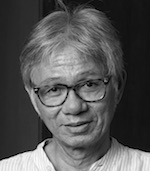
Senator Alan Cayetano traveled last week to Geneva, in Switzerland, to appear at a United Nations inquiry and argue on behalf of the Duterte government that, if any summary executions were happening in its war on drugs, these were not "state-sponsored".
He made other points, but still they were mainly about “extrajudicial killings” or “EJKs”, as they have come to be commonly called. He took issue particularly with media and other unofficial accounts of them and pronounced them falsehoods, as if these things don't qualify as truth until they have been Duterte-sanctified.
An immediate concern for Cayetano’s representation was a complaint against Duterte with the International Criminal Court (ICC), based also in Geneva. The complaint was filed by Jude Sabio, lawyer for Edgar Matobato, who came forward last year and, in a foreshadowing of the present-day EJKs, confessed at a Senate hearing that he had been an assassin on a death squad in Davao City when Duterte was its mayor.

With reports of multiple drug-war deaths almost daily in the first 7 or 8 months of Duterte's 6-year presidential term – reports backed by eyewitness accounts, pictures, and television footage taken by the networks as well as public closed-circuit systems – how did Cayetano expect to make anyone disbelieve them and believe his word instead? One apparent trick was to seize on the phrase "state-sponsored", as EJKs are widely alleged, and split hairs around it.
To be sure, the phrase lends itself to semantic twisting, a game that lawyers like Cayetano like to play. But Etta Rosales, the former chairperson of the Commission on Human Rights, would not let any of that sort of thing pass. "Hogwash!" she declared and, with simple, cutting logic, asked rhetorically what government will dare admit "sponsoring" such brutality.
But let’s indulge Cayetano, for the moment anyway. I'm not sure how the two words that form the disputed phrase “state-sponsored” are defined exactly in Cayetano's legal profession. But I can’t imagine the word "sponsor" taking any meaning that departs essentially from the ones in lay usage: back, support, promote, sanction, approve of.
Gravest moral issue
Doesn't President Duterte do any and all that when he warns drug dealers and addicts, "I will kill you"? Doesn't he betray an even more perverse streak when he says he will be "happy to slaughter" all 3 million of them? Doesn't he encourage excesses by promising presidential protection to the extent of pardon to policemen prosecuting his drug war?
Concededly, the word "state", used synonymously with "president", can provoke legitimate contention: When does a presidential act become an act of the state? Maybe we could all agree to settle for a phrase that replaces “state” with “president” and takes “sponsored” for its partner or any of its synonyms. Thus, the President, who, after all, likes to invite challenges, is tested for his tough talk. Let him assume all responsibility for all the deaths in his war and all the abuses of his war enforcers, so that the “state” – whatever that is – may be spared.
But what are we doing, really, if not simply quibbling — and quibbling over the gravest moral issue of our time. Thousands of lives have been taken summarily, and we are debating whether those killings were justified or not.
I'm reminded of a line from a movie, a comedy as it happens and, as such, appropriately desperate, I think, for drawing attention to the sick tragedy of our lives:
"I am drowning here, and you are describing the water!"
The resonance in fact does not end there. The ultimate evocation of our tragicomic situation comes from the title of the movie: “As good as it gets”. – Rappler.com